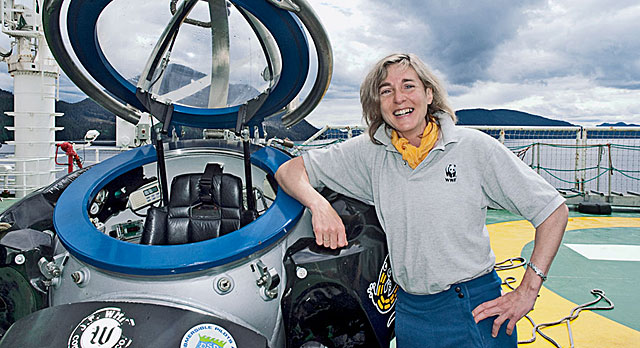sierraclub.org - sierra magazine - nov/dec 2011 - act
 Michelle Ridgway, Auke Bay, Alaska; founder, Alaska Deep Ocean Science Institute | Photo by David E. Guggenheim
Michelle Ridgway, Auke Bay, Alaska; founder, Alaska Deep Ocean Science Institute | Photo by David E. Guggenheim
DEEP SCIENCE
"In the early 1990s I was with a team of divers studying the growth of kelp under sea ice around Alaska's St. Lawrence Island, and there were a bunch of local kids—indigenous Siberian Yupiks—who trailed after us while we worked. A girl named Kiwatangaghmii, who was 10 when I met her, even camped with me over the years. She learned to 'dive' by using my regulator and mask in a five-gallon bucket.
"It was Kiwatangaghmii who suggested that, instead of working all the time, I should teach the students about the sea by bringing them to a whaling camp outside the village. She and her friends then listed all the things they would like to learn during camp—and basically crafted a fun curriculum for research into the sea life around their island.
"I teamed up with the Alaska Marine Conservation Council and launched the first Marine Science Camp series in 2005. Aleut students from Kodiak and Old Harbor spent 12 days on a remote island in what some have called 'science boot camp.' We studied undersea life with remote-operated vehicles and looked at bivalve populations, halibut food webs, and other aspects of the local marine ecosystem.
"Younger students especially learn to appreciate and care for exotic life-forms as they discover facets of the sea around them. I let them make their own decisions about conservation but remind them that the jellyfish, vermilion sea worms, baby king crabs, and sea stars have no voice to speak for themselves. We discuss how humans affect 'planet ocean,' and that knowledge of sea critters can help reduce our impact.
"My students are pretty smart. On the Pribilof Islands they draw complex predator-prey and food-web diagrams that always include their communities, which still live off marine organisms with whom they share the Bering Sea. Their elders are curious about what the students are learning, which in turn inspires the kids to focus, work hard, and go home to share stories about sea life with people who care about such tales."
—interview by Michael Engelhard
Michelle Ridgway discovered the world's second known population of golden V kelp (Aureophycus aleuticus) diving after a hydrophone her students had accidentally dropped as they listened to whales and seals off St. George Island.
For more information on the Marine Science Camp, go to http://bit.ly/marinecamp.